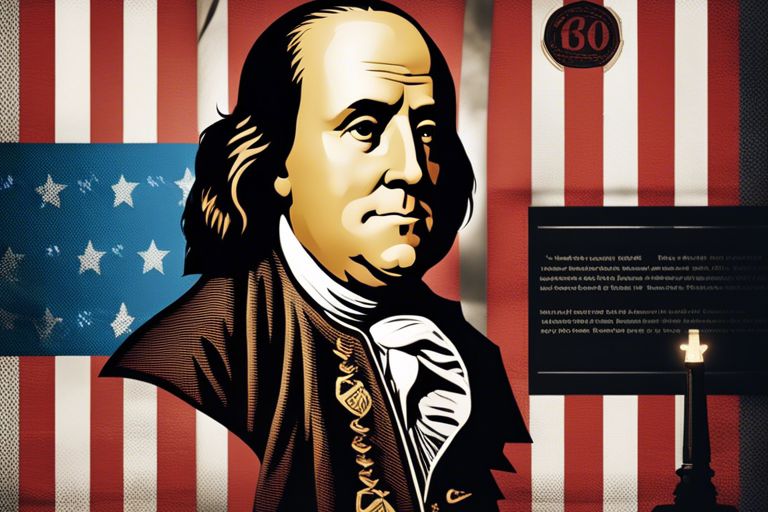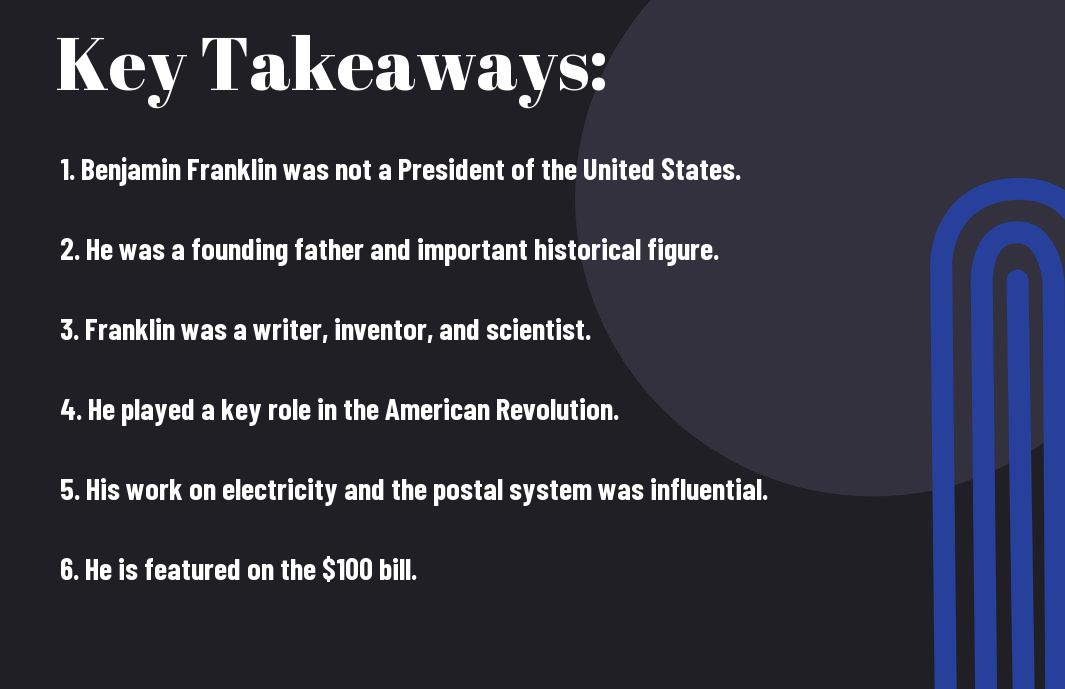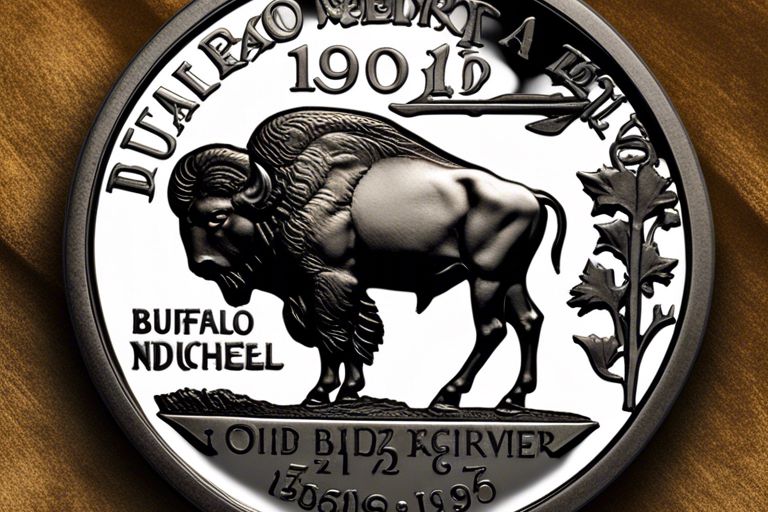Amidst the pantheon of American historical figures, Benjamin Franklin stands as a towering intellect and influential statesman. However, contrary to popular belief, Benjamin Franklin was never a President of the United States. In this blog post, I will delve into the life and accomplishments of Franklin, shedding light on his numerous contributions to American society and the world at large. If you’re interested in learning fascinating details about this remarkable figure, be sure to check out Fun Facts About Benjamin Franklin to expand your knowledge.
Key Takeaways:
- Benjamin Franklin Was Not a President: Contrary to popular belief, Benjamin Franklin was never a president of the United States. He did, however, play a crucial role in the founding of the nation and was a prominent statesman.
- Franklin’s Contributions: Benjamin Franklin was a pivotal figure in American history, making significant contributions to the fields of science, diplomacy, and literature. He is best known for his experiments with electricity and his role in the drafting of the Declaration of Independence.
- Founding Father: Benjamin Franklin is often referred to as a Founding Father of the United States due to his involvement in the American Revolution and the creation of the country’s key documents, such as the Declaration of Independence and the Constitution.
- Diplomatic Achievements: Franklin’s diplomatic skills were instrumental in securing crucial support for the American cause during the Revolutionary War. He served as the United States’ ambassador to France and played a key role in negotiating treaties with various European powers.
- Legacy and Impact: Benjamin Franklin’s legacy continues to be felt in American society and beyond. His ideas and writings have inspired subsequent generations, and his influence in shaping the United States’ early history cannot be overstated.
Benjamin Franklin’s Early Life and Career
The life of Benjamin Franklin is one of the most intriguing stories in American history. An inventor, author, politician, and founding father of the United States, Franklin’s legacy still continues to influence the world today. As I delve into the early years of this remarkable man, I aim to shed light on his childhood, education, and the significant events that shaped his early career.
Childhood and Education
The upbringing of Benjamin Franklin was quite challenging. Born in Boston in 1706, he was the fifteenth of seventeen children in his family. His father, a candle and soap maker, intended for him to join the clergy. However, due to financial constraints, Franklin’s formal education was limited to only two years. As a result, he was mostly self-taught. Despite these setbacks, Franklin’s thirst for knowledge led him to become an avid reader and a proficient writer. He showed great promise as a young boy, but his potential was not fully realized until he left for Philadelphia to seek a new beginning.
Apprenticeship and Early Career
At the age of 17, Franklin left Boston and headed for Philadelphia, where he found work as a printer’s apprentice. His early career in the printing industry shaped his future in remarkable ways. The job presented him with numerous opportunities to interact with the intellectual elite of the time and allowed him to cultivate his writing and critical thinking skills. In 1729, Franklin became the owner of the Pennsylvania Gazette, which provided him with a platform to express his opinions and ideas. His success in the printing industry was just the beginning of a prosperous and eventful life that would leave an indelible mark on the world.
Franklin’s Role in American Independence
Now let’s explore Benjamin Franklin’s crucial role in the American independence movement. As one of the Founding Fathers of the United States, Franklin played a pivotal part in shaping the country’s path to independence and shaping its future as a nation.
Contributions to the Declaration of Independence
One of Franklin’s most significant contributions to the American independence movement was his involvement in the drafting of the Declaration of Independence. As a member of the Committee of Five, Franklin provided valuable input in crafting the document that would declare America’s independence from British rule. His eloquent writing and persuasive arguments helped to solidify the principles and ideals that would guide the new nation. Franklin’s diplomatic skills and ability to form alliances were instrumental in garnering international support for the American cause.
Diplomatic Missions and Treaty Negotiations
In addition to his contributions to the Declaration of Independence, Franklin also played a vital role in diplomatic missions and treaty negotiations that were crucial to the success of the American Revolution. He served as an ambassador to France, where he skillfully negotiated for French assistance in the war against Britain. His diplomatic efforts in securing the Treaty of Alliance with France and the Treaty of Paris were essential in securing victory for the American colonies.

Later Years and Legacy
Your research into Benjamin Franklin’s life may have made you wonder about his later years and the legacy he left behind. As he continued to be deeply involved in public service, his contributions extended far beyond the years of his most famous accomplishments. Franklin came to be known as a key figure in the American Enlightenment, a period in which intellectualism and reason were highly esteemed. His writings and political activities reflected the ideals of this movement, which sought to apply reason and science to all aspects of life and society. If you’re interested in learning more about Benjamin Franklin and the American Enlightenment, you can read an insightful essay on the topic here.
Role in the Constitutional Convention
During the Constitutional Convention, Benjamin Franklin played a crucial role as one of the oldest and most experienced delegates. I am sure you’ll find it fascinating to learn that despite his advanced age, he was an active participant in the discussions, offering his wisdom and insights. His presence added a level of gravitas to the proceedings, and his efforts were instrumental in helping to shape the final document that would become the foundation of the United States government.
Philanthropy and Scientific Contributions
In his later years, Franklin also continued his philanthropic and scientific endeavors. His dedication to improving the lives of others was evident in his numerous contributions to public causes such as education, fire safety, and libraries. Additionally, his scientific experiments and discoveries, such as those related to electricity and the development of the lightning rod, had a profound impact on the world. The positive influence of Franklin’s work in these areas cannot be overstated, as they continue to benefit society to this day.

Conclusion: Benjamin Franklin – Was He a President? Exploring Historical Figures
Hence, it is clear that Benjamin Franklin was not a President of the United States. However, his impact on American history and society cannot be understated. His contributions as a writer, inventor, statesman, and diplomat have left an indelible mark on the country. Despite never holding the office of President, Franklin’s legacy continues to be celebrated and revered by people all over the world. By studying historical figures like Franklin, we gain a deeper understanding of the complexities of the past and the diverse individuals who have shaped it.
FAQ
Q: Was Benjamin Franklin a President?
A: No, Benjamin Franklin was not a President of the United States. He was a founding father, statesman, diplomat, and inventor, but he never served as President.
Q: What role did Benjamin Franklin play in American history?
A: Benjamin Franklin played a significant role in American history. He was one of the founding fathers of the United States, and his contributions as a diplomat, scientist, and author were instrumental in shaping the country’s early development.
Q: What are some of Benjamin Franklin’s most notable achievements?
A: Benjamin Franklin is best known for his work as a diplomat, where he played a vital role in securing support from France during the American Revolution. He is also renowned for his scientific experiments with electricity, as well as his role as an author and publisher.
Q: What is Benjamin Franklin’s most famous publication?
A: Benjamin Franklin’s most famous publication is “Poor Richard’s Almanack,” a yearly publication that contained a wealth of information, including weather forecasts, household tips, and proverbs. It was widely popular and contributed to his reputation as a prolific writer and thinker.
Q: How is Benjamin Franklin remembered today?
A: Benjamin Franklin is remembered as a multifaceted figure in American history. He is celebrated for his contributions to science, diplomacy, and literature, and his likeness can be found on the $100 bill. His legacy continues to inspire and influence people around the world.









Leave a comment